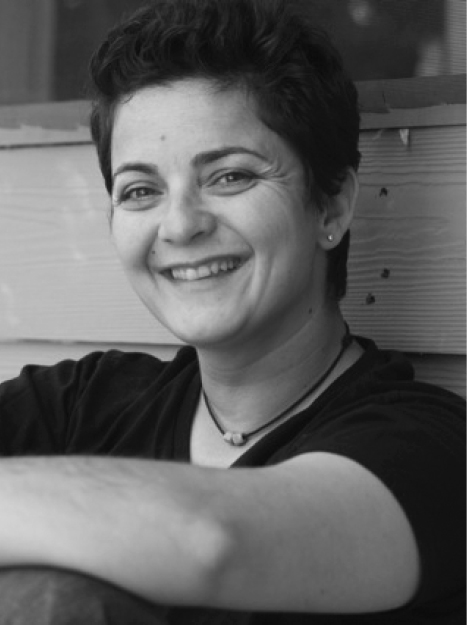
Photograph courtesy of Bailey Clement
In 2004, Luma Mufleh stumbled upon a group of boys playing soccer in the street after taking a wrong turn on her way home. The kids were refugees from several different countries, speaking different languages, but they bonded over the game. It inspired Mufleh to start and coach a team for young refugee boys to give them free access to organized soccer, but as time went on, Mufleh realized that the children she was working with needed much more support.
Based in Clarkston, Mufleh created the nonprofit Fugees Family in 2006 to continue supporting the boys via soccer and after-school tutoring. The next year, she opened Fugees Academy, a privately funded middle school for refugee boys. The academy expanded three years later to serve both boys and girls and teach children from grades six to 12. Soccer has remained a large, important part of Fugees Family and is a way the organization empowers the kids in transitioning effectively into life in the United States.
Mufleh was recently announced as the winner of 2018 People’s Voice DVF Award, part of an awards program created by fashion designer Diane von Furstenberg and her Diller-von Furstenberg Family Foundation to honor “extraordinary women who are dedicated to transforming the lives of other women.” Other DVF Award honorees this year include Supreme Court Justice Sonya Sotomayor, ballet dancer Misty Copeland, jewelry designer Ariela Suster, and women’s rights activist Jaha Dukureh. Mufleh was one of four nominated for the People’s Voice award, with the winner chosen through an online poll. She earned a $50,000 grant for Fugees Family and will be honored Friday at the DVF Awards, held at the United Nations in New York City.
Below, Mufleh discusses what winning this award means to her and how Fugees students continue to break barriers every day.
What is the transition into living in the United States like for the young refugees that you work with?
That’s a hard one. I think for the students I work with, the transition is a little easier for them than it is for their parents, because the younger you are when you come here, the easier it is to acclimate. But we work with kids that have never set foot in a school. We work with kids whose families have never had a stove or an oven, which are all things we take for granted. I think it takes awhile.
How has soccer been a useful tool in helping the kids make that transition?
I think soccer, especially [here], is a really powerful tool for kids because it gives them something that’s really familiar—something that they know inside and out, something that has a lot of positive connotations. They grow up in the refugee camps playing soccer and they watch their favorite soccer stars play on TV, so it makes the transition into the United States a little bit easier. You take the power of something beautiful and familiar and use that to introduce them to a slew of other things.
For our kids, [playing soccer is] the safest place they can be. When they go out to practice for two hours, it’s safe; they won’t be judged for who they are, and they are surrounded by teammates who have all had the same experience. Every kid on our team is a refugee, so they can just be themselves and play, which is what sports are supposed to be about.
You’ve received multiple awards, but the DVF Awards were created specifically to recognize “extraordinary women.” What does winning the award mean to you as a woman?
It’s more meaningful because it is an award that recognizes women, and I think there needs to more awards where women support other women, lift each other up, and highlight their accomplishments. I am in a little bit of denial, because I didn’t expect to win at all. The competition was pretty fierce; when I looked at all of the other nominees [like Erin Loos Cutraro, founder of She Should Run, an organization that encourages women to run for public office; or Laura Hackney and Jessica Hubley, who train victims of human trafficking how to code and program software], I thought “Oh, Georgie [Smith, the founder of nonprofit A Sense of Home, which supports foster children] is going to win,” and I really didn’t think it would be me. We constantly talk about the need to support women-led businesses and organizations, but I think this award is literally putting your money where your mouth is.
Fugees Academy will have its first female graduate this May. How does having the opportunity to get an education change the way the girls in the academy feel about themselves and the world?
We started off as a boy’s academy [in 2007] and went co-ed three years later, so I think that for all of the girls in our school, having [this female student] cross that finish line is incredibly powerful. We don’t realize how hard it is for girls around the world to complete school and go on to college or a career.
Especially in [the Fugees] community, we had a lot of pressure from our families to not have soccer after school so that the girls could come home and help . . . so I think that this is symbolic; we got her to the finish line, and we have five girls next year who will graduate, and I think everyone is just excited that she has surpassed everybody’s expectations.
For me, it’s more personal. I grew up in the Middle East, where women are second class citizens, and I never thought that I would start an organization that was boys-only, but I think that it is important for young men to see women in leadership positions and have women coach them and mentor them. Overall, I think we’ve shattered the barrier in a lot of areas.
Recently, a post on the Fugees Family Facebook page stated that one of the female soccer players was told she couldn’t play in a game unless she proved to the referee that she wasn’t wearing jewelry under her hijab. The following Monday, another post said that incident was turned into a lesson in activism for the Fugees students. How will Fugees continue the conversation about tolerance and acceptance, especially in the current political climate?
I never thought that our program would be political; we always thought, “We work with kids, so it’s about them: educating them, teaching them to be children again, and integrating them into the United States.” We never imagined we would be a political cause, but after that incident we had to bring all the students in, and it changed our whole day in terms of what we were going to do. We cancelled all the [planned] classes that day and did sessions on advocacy, how to stand up for themselves, and what their rights are.
The process right now is to file an appeal with Georgia Soccer, and we had the students lead the entire process with collecting all the writing, practicing their statements, and recounting what happened. I had to have an honest talk with them and tell them that by being in this school, they are making a political statement, because we challenge a lot of the ideas of what a refugee should be. [Many] people think that refugees are terrorists, and our kids get that a lot on the soccer field from opposing teams, with kids telling them, “Go back to where you came from,” or asking, “Are you going to bomb us?” They’ll make fun of their names or what they’re wearing, and that shouldn’t happen anywhere, let alone on sports field, but our responsibility and obligation is to keep holding our heads up high and represent ourselves the way we are.
I told them, “You’re kids, and you don’t have to be perfect, but when someone doesn’t treat you with respect, this is how you handle it.” We teach our kids not to stoop down to anyone’s level and not to retaliate, but it’s been hard. It’s even harder now, because things seem to be escalating. Especially with this [White House] administration, people seem to think they have permission to say whatever they want. Our kids are getting this from other players on the field, parents of the other team, and it’s just hurtful—it’s hurtful to watch that happen, because this is not the United States that welcomed me 20 years ago as an immigrant. I was in the U.S. for 9/11, and even then it wasn’t like this.
How do you hope to see Fugees grow over the next few years? What about long term?
We’re very excited that we’re opening our second location in Columbus, Ohio this fall. Long term, we plan on opening one school per year, and we are trying to become a model for refugee education and integration. I’m really excited about that because I never thought that starting a soccer team in a parking lot would lead to setting up a national network for refugee kids.













